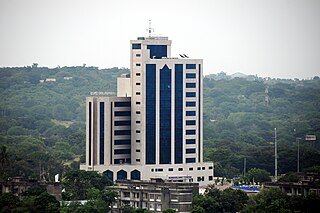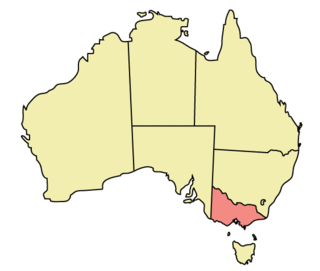
A statutory instrument (SI) is the principal form in which delegated legislation is made in Great Britain.
The Competition Commission was a non-departmental public body responsible for investigating mergers, markets and other enquiries related to regulated industries under competition law in the United Kingdom. It was a competition regulator under the Department for Business, Innovation and Skills (BIS). It was tasked with ensuring healthy competition between companies in the UK for the ultimate benefit of consumers and the economy.

The Office of Rail and Road (ORR) is a non-ministerial government department responsible for the economic and safety regulation of Britain's railways, and the economic monitoring of National Highways.

The Scottish Charity Regulator is a non-ministerial department of the Scottish Government with responsibility for the regulation of charities in Scotland.

The Health and Safety at Work etc. Act 1974 is an act of the Parliament of the United Kingdom that as of 2011 defines the fundamental structure and authority for the encouragement, regulation and enforcement of workplace health, safety and welfare within the United Kingdom.

The Malaysian Communications and Multimedia Commission is a regulatory body whose key role is the regulation of the communications and multimedia industry based on the Malaysian Communications and Multimedia Commission Act 1998, the Communications and Multimedia Act 1998, and the Strategic Trade Act 2010. MCMC is similar to the National Telecommunications Commission (NTC) in the Philippines. Its role to implement and promote the Government's national policy objectives for the communications and multimedia sector.
The Commerce Commission is a New Zealand government agency with responsibility for enforcing legislation that relates to competition in the country's markets, fair trading and consumer credit contracts, and regulatory responsibility for areas such as electricity and gas, telecommunications, dairy products and airports. It is an independent Crown entity established under the Commerce Act 1986. Although responsible to the Minister of Commerce and Consumer Affairs and the Minister of Broadcasting, Communications and Digital Media, the Commission is run independently from the government, and is intended to be an impartial promotor and enforcer of the law.
Botswana Telecommunications Authority (BTA) is a dissolved independent commission that was responsible for regulating all matters related to telecommunications, postal services of Botswana and has been succeeded by Botswana Communications Regulatory Authority. The Minister appoints all five board members, who serve on a part-time basis. The BTA is mandated to promote the development and provision of efficient telecommunications and broadcasting services in Botswana, under the terms of the Telecommunications Act 15 of 1996. There have been legal disputes between the BTA and licensed operators, springing from issues related to interconnection and pricing.

The Tanzania Communications Regulatory Authority (TCRA), established by the TCRA Act No. 12 of 2003, is an independent Authority for the postal, broadcasting and electronic communications industries in the United Republic of Tanzania based in Mikocheni ward of Kinondoni District of Dar es Salaam Region. It merged the former Tanzania Communications Commission and the Tanzania Broadcasting Commission. The TCRA is accountable to the Communications and Technology Ministry. The Information Communication and Technology (ICT) sector reform in Tanzania is notable in that development was influenced by regional, political (national) and technological factors. Tanzania is one of the few African countries to liberalise the communications sector whereby the Converged Licensing Framework (CLF) is used as a key strategy, in terms of the Tanzania Communications Regulations. Since inception in 2003, the TCRA has issued a number of regulations to administer the sector, but still faces a number of challenges such as the roll-out of services to under-serviced rural areas.

The Accident Towing Services Act 2007 is a law enacted by the Parliament of the State of Victoria, Australia. The act is the prime statute regulating the vehicle towing industry which provides towing and recovery services for light and heavy road vehicles across Victoria. It is predominately founded on safety and consumer protection sentiments. The act continued economic controls over the industry and contains occupational regulation characteristics. The style of the underlying regulatory scheme varies in parts and represents a blend which is prescriptive in some parts and performance and process-based in others.

The Taxi Industry Inquiry or the Fels Inquiry was an inquiry commissioned in 2011 into the taxi industry and taxi services in Victoria, Australia, by the Taxi Services Commission. The inquiry was headed by Professor Allan Fels assisted by Dr David Cousins.
Financial regulation in Australia is extensive and detailed.

Commercial Passenger Vehicles Victoria (CPVV), until 2 June 2018 called the Taxi Services Commission (TSC), is the Government agency responsible for the regulation of the taxi and hire car industries in the State of Victoria, Australia. Before becoming a regulator, the TSC was responsible for conducting a major independent inquiry, the Taxi Industry Inquiry, into taxi and other small commercial passenger vehicle services in the State.
The Transport Legislation Amendment Act 2011 is a law enacted by the Parliament of the State of Victoria, Australia to reform taxi and other small commercial passenger vehicle services in the State.

The Transport Act 1983 is a prime statute regulating transport activities in the State of Victoria, Australia. Key areas regulated by the statute currently include taxi and hire car services and compliance and enforcement, particularly in areas like safety and public transport ticketing and conduct.

The Electricity Act 1989 provided for the privatisation of the electricity supply industry in Great Britain, by replacing the Central Electricity Generating Board in England and Wales and by restructuring the South of Scotland Electricity Board and the North of Scotland Hydro-Electric Board. The Act also established a licensing regime and a regulator for the industry called the Office of Electricity Regulation (OFFER), which has since become the Office of Gas and Electricity Markets (OFGEM).

The Competition and Markets Authority (CMA) is the principal competition regulator in the United Kingdom. It is a non-ministerial government department in the United Kingdom, responsible for strengthening business competition and preventing and reducing anti-competitive activities. The CMA launched in shadow form on 1 October 2013 and began operating fully on 1 April 2014, when it assumed many of the functions of the previously existing Competition Commission and Office of Fair Trading, which were abolished. The CMA also has consumer protection responsibilities and take on new digital markets regulation responsibilities in late 2024 under the Digital Markets, Competition and Consumers Act 2024.
The Ley Federal de Protección de Datos Personales en Posesión de los Particulares, is a law of Mexico, approved by the Mexican Congress on April 27, 2010. The law aims to regulate the right to informational self-determination. The law was published on July 5, 2010, in the Official Gazette and entered into force on July 6, 2010. Its provisions apply to all natural or legal persons who carry out the processing of personal data in the applicable exercise of their activities. Companies such as banks, insurance companies, hospitals, schools, telecommunications companies, religious organizations, and professionals such as lawyers, doctors, and others, are required to comply with the provisions of this law.

The Postal Services Act 2012, is a Malaysian laws which enacted to provide for the licensing of postal services and the regulation of the postal services industry, and for incidental or connected matters.

Authority for Info-communications Technology Industry (AITI) is an independent commission in Brunei founded under the Telecommunications Order, 2001 in 2001. AITI is responsible for regulating all matters related to telecommunications of Brunei.











